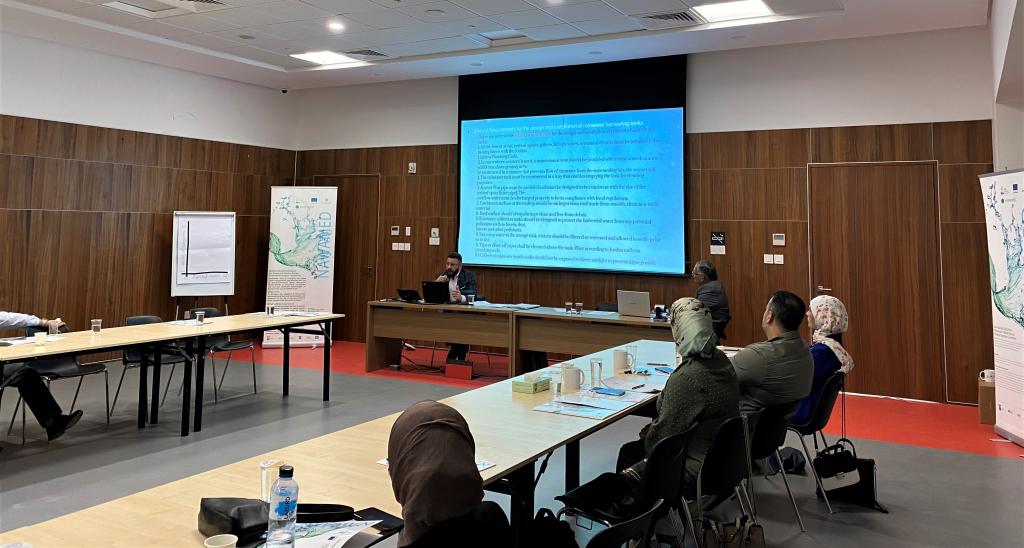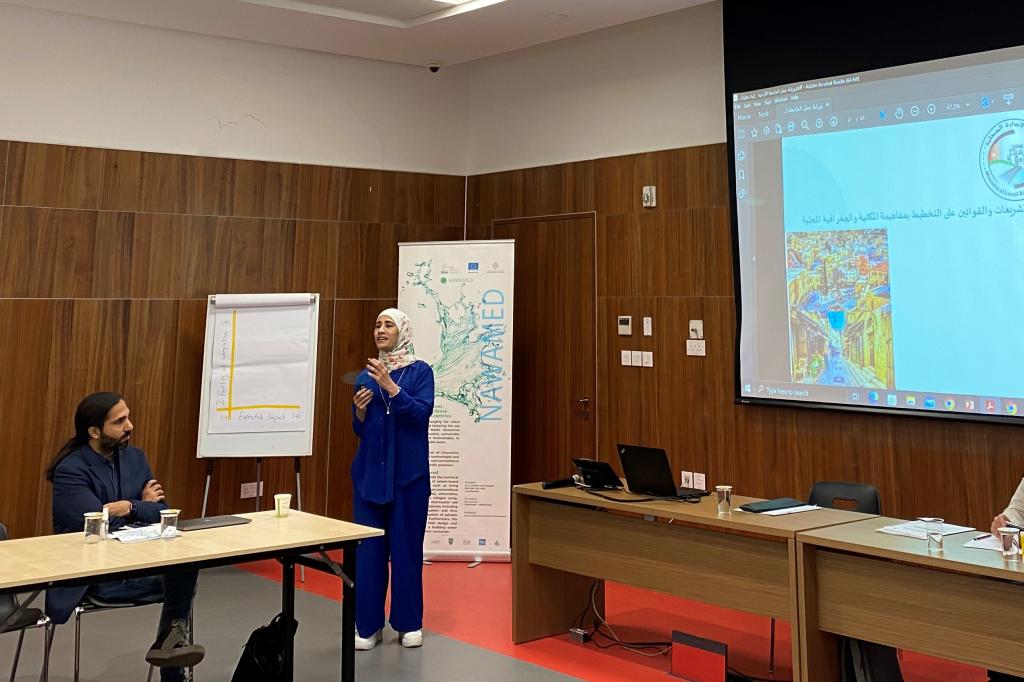NAWAMED: Discussion on possible solutions to increase the adoption of Non-Conventional Water reuse in Jordan
The University of Jordan organized a Decision Makers Workshop on June 6th, 2023 at the University of Jordan.
More than 40 representatives from ministries, local public bodies, architects, research centers and academia, attended the workshop.
During the workshop, the participants discussed and identified the local regulations and urban planning tools to increase the adoption of non-conventional water (NCW) reuse in Jordan.
The workshop included three consecutive sessions, and each of them consisted of a presentation and a discussion where the participants proposed suggestions and solutions to increase the application of nature-based solutions (NbS) for NCW reuse. In addition, a field visit to the University of Jordan's pilot plant (Al-Zahra'a dormitory) was conducted.

The workshop started by presenting an overview of NAWAMED project by Prof. Ahmed Al-Salaymeh, NAWAMED project coordinator at UJ.
In the first session, Eng. Ahmad Bali, Head of Planning of Water Demand Department at the Ministry of Water and Irrigation spoke about the water situation in Jordan and the local regulations related to rainwater management.

The design of the rainwater tank was included in the Building Permit Law within the boundaries of the Greater Amman Municipality for planning and construction projects for the year 2020 in The Official Gazette of the Hashemite Kingdom of Jordan.
Nowadays, the Ministry of Water and Irrigation, represented by the Water Demand Directorate, in cooperation with the Ministry of Local Administration, is preparing a booklet on home rainwater harvesting for all municipalities in the Kingdom.
In the second session, Eng. Zainab Abu Zaid, General Manager of the Water, Environment and Energy Consulting Company, spoke about governance and the legal framework for grey water reuse in Jordan.

Establishing monitoring and enforcement mechanisms can be challenging due to limited resources, the need for specialised expertise and ensuring compliance across a wide range of users. However, it is crucial to maintaining safe and sustainable greywater reuse practices
The third session was dedicated to “Urban Planning tools to foster the application of Nature - Based Solutions for the reuse of Non-Conventional Water (NCW)”.
The session was started with a presentation on “Planning, Land Use and Building Regulations in Jordan” delivered by Prof. Nabeel Al-Kurdi, Chairman of Architecture Engineering Department at UJ.

After that, Mrs. Lina Attyait, Regional Planner and Head of the Urban Environmental Management Department at the Ministry of Local Administration delivered a presentation on the impact of legislation and laws on planning in terms of spatial and local geography. She concluded that one of our principles for the future of urban planning is the adoption of the National Urban Policy, which is now in the process of being submitted to the Steering Committee of the Prime Ministry.

Then, Eng. Ahmad Zeyad, an Urbanist from Greater Amman Municipality delivered a presentation about “Fostering the Application of Nature-Based Solutions for Non-Conventional Water Reuse through Urban Planning Tools”.
Urban planning tools are important since they integrate Nature Based Solutions and Non-Conventional Water reuse into development plans and policies. They enable local authorities to create incentives, regulations, and policies supporting NbS adoption. In addition, Urban planning ensures the efficient use of NbS, maximizing benefits. Furthermore, the integration of NbS and NCW reuse into urban planning fosters sustainable, water-secure cities that are resilient to climate change and promotes environmental stewardship

In addition, Eng. Zeyad presented some local strategies and action plans which deal with NbS and NCW issues such as Amman Resilience Strategy, Climate Action Plan, U20 White Papers, Green City Action Plan and Updated Climate Action Plan.
Participants agreed on a number of conclusions, such as investing in research and development efforts can have long-term benefits, but may require significant funding, collaboration with academic institutions, and exploration of innovative technologies. It can help advance grey water treatment methods and risk assessment practices. Financial incentives can encourage implementation, but may require budget allocation and coordination with relevant authorities to implement and manage these incentives effectively. In addition, raising awareness and education can be facilitated through targeted campaigns, public events and educational materials to increase awareness and understanding of greywater reuse.









